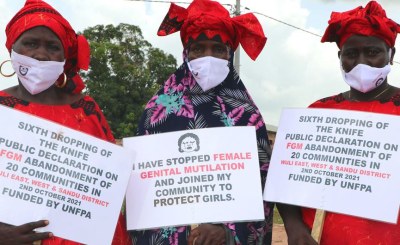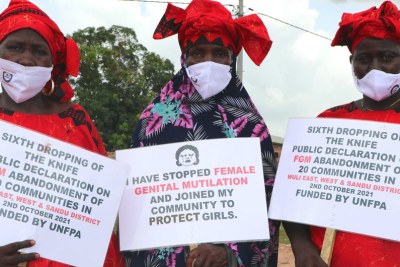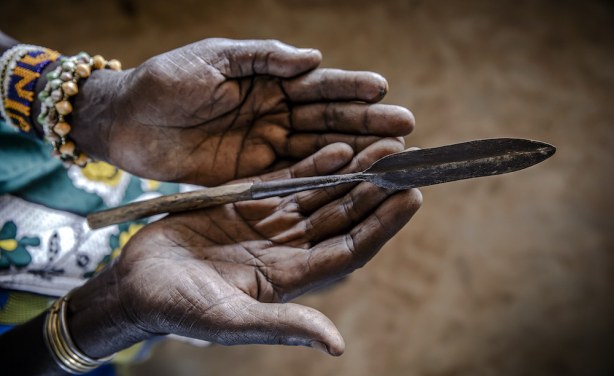-
The Conversation Africa, 28 March 2024
The Gambia's ban on female genital mutilation (FGM) since 2015 is under threat. Proposed changes before parliament could permit medicalised female genital cutting and allow it for… Read more »
-
Gambia: The Gambia Must Not Repeal FGM Ban
IPS, 27 March 2024
Earlier this month, a UNICEF report on the prevalence of female genital mutilation (FGM) showed that while some success is taking place, the pace of progress remains slow - lagging… Read more »
-
Gambia: Gambian Lawmakers to Vote On Bill to Repeal FGM Ban
VOA, 18 March 2024
A Monday vote could make Gambia the first country to repeal its ban on female genital cutting. Also referred to as female genital mutilation, or FGM, the procedure includes the… Read more »
-
Gambia: Lawmakers Move Forward On Bill to Reverse FGM Ban
DW, 18 March 2024
Gambian lawmakers voted 42 in favor and four against to send the FGM ban reversal bill to a parliamentary committee. Activists warn that the bill will harm Gambia's human rights… Read more »
-
Gambia: Is FGM/Female Circumcision a Religious Question or a Medical Question?
Foroyaa, 18 March 2024
Foroyaa has and is still cautioning National Assembly members and the Gambian people at large not to distort the truth when it comes to discussion on the issue of FGM/Female… Read more »
-
Gambia: Parliament Must Not Lift the Ban Against Female Genital Mutilation
AI London, 15 March 2024
Responding to the upcoming vote in Gambia's parliament on 18 March on a bill to reverse the ban on female genital mutilation (FGM), Michèle Eken, senior researcher at… Read more »
-
Africa: UN Alarmed Over Ever-Rising Cases of Female Genital Mutilation
RFI, 8 March 2024
The number of female genital mutilation survivors now exceeds 230 million worldwide, with most living in Africa, according to Unicef. That represents an increase of 15 percent… Read more »
-
Gambia: Women's Rights - Gambia Discusses Bill to Repeal FGM Ban
DW, 7 March 2024
Women's rights are under threat as Gambia's parliament discusses a bill to roll back a ban on female genital mutilation. Read more »
-
Gambia: The Gambia's Parliament Considers Lifting Ban on FGM
allAfrica, 7 March 2024
The Gambian government is discussing lifting the ban on female genital mutilation (FGM) this month. Some Gambian members of parliament believe that declaring the practice illegal… Read more »
Gambian Parliament Moves Forward On Bill to Reverse FGM Ban
Gambian lawmakers voted to advance to the next parliamentary stage a bill to reverse the ban on female genital mutilation (FGM), sparking concerns among activists about potential harm to the country's human rights progress.
The ban, in place since 2015, saw a significant decrease in FGM prevalence in Gambia, but proponents of the reversal argue it upholds religious and cultural values. Activists and human rights organizations say the suggested legislation reverses years of progress and risks damaging the country's human rights record.
A UN report shows a significant drop in female genital mutilation (FGM) in Gambia since it was banned, highlighting the effectiveness of such legislation. The World Health Organization says female circumcision has no health benefits and can lead to excessive bleeding, shock, psychological problems, and death. Gambia faces a critical decision, as repealing the ban would be an unprecedented setback in protecting girls from this harmful practice.
InFocus
-
Although the World Health Organisation has continuously warned of the serious health risks associated with FGM, many countries have struggled to end the practice. The Gambian ... Read more »




